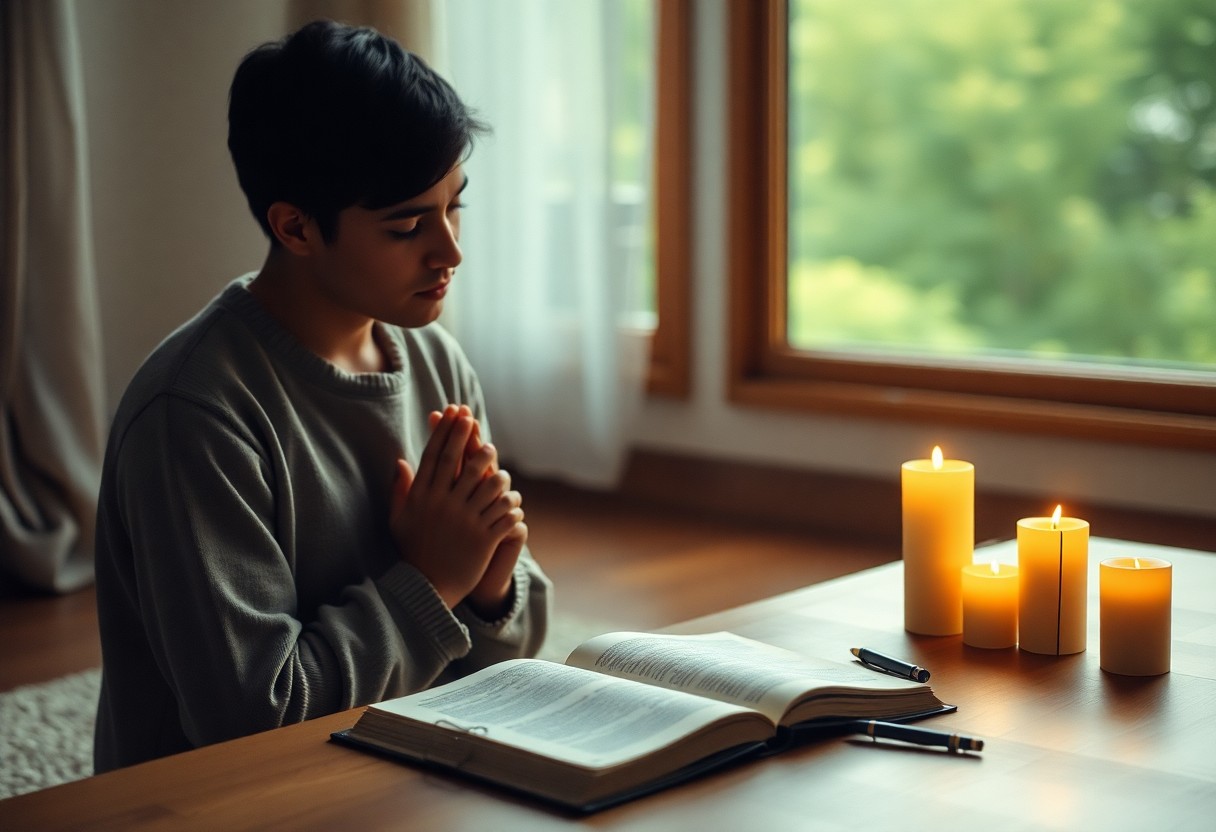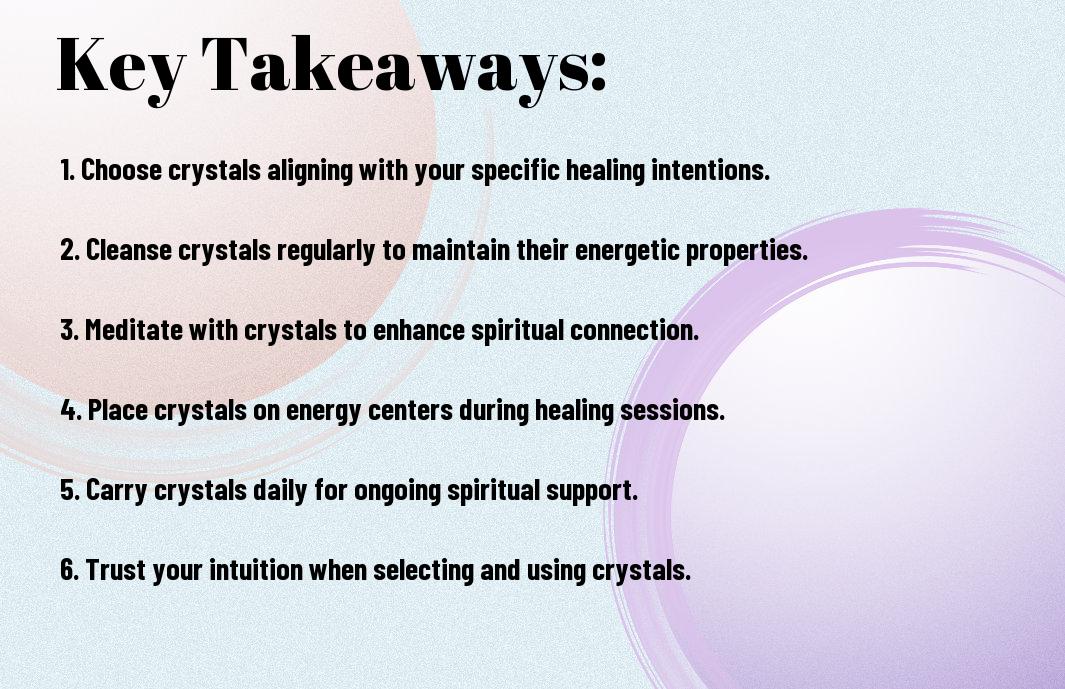There’s a profound connection between your actions and the experiences you encounter in life, often referred to as karma. By exploring the principles of karma, you can gain insightful perspectives on how your choices influence your spiritual growth and personal development. This blog post will guide you through the fundamental aspects of karma, shedding light on its role in shaping your journey and helping you cultivate a more intentional and fulfilling life as you navigate your path to self-awareness.

Key Takeaways:
- Karma refers to the law of cause and effect, where our actions influence future experiences.
- Spiritual growth is closely linked to understanding and reflecting on one’s karmic patterns.
- Recognizing positive and negative actions allows for conscious choices that alter future outcomes.
- Forgiveness plays a vital role in resolving past karma and moving forward on your spiritual path.
- Engaging in mindfulness practices can help cultivate awareness and improve the quality of one’s karma.
The Concept of Karma
For many, karma represents the law of moral cause and effect, where every action has corresponding consequences. This principle suggests that your intentions and deeds contribute directly to your spiritual evolution. Karma is not merely a system of punishment or reward; instead, it serves as a guide for your actions, encouraging you to cultivate positive behaviors that align with your highest self. Understanding karma can pave the way for personal growth and a deeper connection to your spiritual journey.
Historical Perspectives
An exploration of karma reveals its origins in ancient Indian philosophy, where it first appeared in texts like the Vedas and Upanishads. Over centuries, these ideas evolved, influencing various spiritual traditions and philosophical schools of thought. Notably, in Buddhism, karma is emphasized as a key factor in the cycle of birth and rebirth, guiding the ethical practices that shape your current and future lives. Understanding its historical roots can enhance your appreciation of its significance in your spiritual journey.
Karma in Different Religions
Alongside its roots in Hinduism and Buddhism, karma also finds interpretations in other religious frameworks, such as Jainism and Sikhism. Each tradition encapsulates unique beliefs about how karma affects your life journey and spiritual path.
It is interesting to note that while karma traditionally signifies the law of cause and effect, its interpretations can vary significantly. For example, Jainism places a strong emphasis on non-violence, with karma viewed as a substance that binds to your soul due to harmful actions. In Sikhism, karma is intertwined with the concept of divine grace, suggesting that while your deeds play a role, ultimately, it is the mercy of the divine that shapes your spiritual destiny. Understanding these diverse perspectives can enrich your comprehension of how karma influences both your actions and spiritual outcomes.
The Mechanics of Karma
Clearly, understanding the mechanics of karma is crucial in grasping how it influences your spiritual journey. The actions you take and the intentions behind them create ripples that affect not only your life but also the universe around you. For a deeper insight into what is the role of Karma in our spiritual journey?, explore the interconnectedness of cause and effect that defines your experiences.
Action and Consequence
Along your journey, every action you take leaves a footprint in your life and the lives of others. This direct correlation between your deeds and their consequences shapes not just your present, but also your future experiences. Each choice you make is a thread woven into the fabric of your existence, leading to outcomes that reflect your intentions and efforts.
The Law of Attraction
With the Law of Attraction, you draw experiences aligned with your thoughts and beliefs. This principle signifies that the energy you emit through your mindset and actions attracts similar energies back into your life. By focusing on positive intentions, you can create a ripple effect that manifests abundance and fulfillment.
Attraction is a powerful element in shaping your reality. When you are attuned to positive thoughts and actions, you begin to magnetize circumstances that resonate with that energy. Conversely, negative thoughts may lead to unfavorable experiences, reinforcing the idea that your inner state directly influences the external world. By nurturing a positive mindset, you can effectively harness the Law of Attraction to elevate your spiritual journey.
Karma and Personal Growth
Keep in mind that your actions today directly influence your spiritual development. By understanding the concept of karma, you can begin to see how each decision and behavior contributes to your personal growth. Embracing this awareness allows you to cultivate positive intentions, leading to a more fulfilling life and a deeper connection to your spiritual journey.
Lessons from Past Actions
From examining the consequences of your past actions, you gain valuable insights that inform your future choices. Every experience shapes your understanding of yourself and others, urging you to reflect on how your behavior has impacted your life and those around you. This awareness helps you to break free from negative patterns and supports your continuous growth.
Developing Empathy and Compassion
One of the greatest gifts of understanding karma is the ability to develop empathy and compassion towards yourself and others. Recognizing the impact of each person’s actions can inspire you to respond with kindness and support, fostering deeper connections and a sense of community. You begin to see that everyone’s journey is colored by their own experiences, and by extending compassion, you contribute positively to your own karma.
Hence, as you cultivate empathy and compassion, you enrich your spiritual journey. By viewing situations through the lens of understanding and kindness, you not only uplift those around you but also elevate your own state of being. Your enhanced emotional intelligence allows you to navigate life’s challenges with grace and resilience, ultimately propelling your personal growth and transformation.
Karma in Daily Life
All aspects of your daily life reflect the concept of karma, shaping your experiences based on your actions and intentions. Every decision you make—be it small or large—carries a consequence that affects not just you but those around you. By recognizing this interconnectedness, you can begin to see how your choices ripple through your life, influencing your spiritual journey and the lives of others.
Mindfulness in Actions
Beside understanding karma’s broader implications, it’s important to practice mindfulness in your actions. This means being aware of your thoughts, words, and deeds and their potential impact. By cultivating a conscious approach to life, you can align your actions with your values, leading to more positive outcomes for yourself and the community around you.
How to Cultivate Positive Karma
Above all, cultivating positive karma involves intentional actions that promote kindness and compassion. Focus on building strong relationships, helping others, and being grateful for what you have. By contributing positively to the world, you not only create a better environment but also invite goodwill into your life.
Daily practices that cultivate positive karma can take many forms, such as volunteering, practicing gratitude, or simply being kind to others. Engaging in acts of service and maintaining an uplifting attitude helps generate positive energy that returns to you in various ways. As you consistently choose kindness and empathy, you create a virtuous cycle of positivity that enhances your spiritual journey and deepens your understanding of karma.
The Spiritual Implications of Karma
Unlike many believe, karma extends beyond simple action and consequence; it holds profound spiritual implications for your journey. Every action you take shapes not just your present circumstances but also your spiritual evolution. By understanding this interconnectedness, you empower yourself to make choices that resonate positively with your soul’s purpose, fostering growth and enlightenment in the process.
Karma and Reincarnation
To understand the full spectrum of karma, you must explore its relationship with reincarnation. Each lifetime presents you with opportunities to learn and evolve, influenced by the karma you carry from previous existences. This continuous cycle emphasizes that your actions in one life can significantly impact your experiences in the next.
Understanding Suffering and Joy
Around each moment of suffering and joy lies the intricate web of karma, guiding your experiences. By acknowledging this connection, you can begin to see how your choices, both good and bad, shape the quality of your life. Embracing this awareness is key to transforming challenges into stepping stones along your spiritual path.
The impact of your actions on suffering and joy is profound; recognizing this empowers you to make more conscious choices. When facing challenges, consider the potential lessons behind them and how they contribute to your growth. Conversely, in moments of joy, reflect on the positive actions that led to such experiences. By adopting this perspective, you create a deeper understanding of life’s ups and downs, ultimately leading you to a more fulfilled and harmonious spiritual existence.
Common Misconceptions about Karma
Not all actions lead to immediate consequences, which can lead to the misunderstanding that karma is merely about punishment and reward. Many believe that every slight action you take will instantly result in a proportional reaction. However, karma is a much broader concept that encompasses the intention behind your actions and the conditions that shape your life experiences over time.
Myths and Truths
Truths about karma reveal that it is not a simple ledger of good and bad deeds. Rather, it serves as a complex system of moral cause and effect where the nuances of your intentions and the context of your actions are taken into account. Understanding this can help you navigate your spiritual journey with more clarity and purpose.
The Role of Intention
To grasp the essence of karma, it’s important to focus on your intentions rather than just your actions. Your motivations play a significant role in shaping the outcomes you experience. When you act with genuine goodwill and mindfulness, you create positive karmic energy that can influence your spiritual path in meaningful ways.
But intentions alone aren’t enough; the consequences may also be affected by external factors and the interconnectedness of life. This means that even if you have good intentions, unforeseen outcomes can arise. Understanding this interplay can deepen your awareness of how karma operates, allowing you to approach situations with greater compassion and thoughtfulness, which ultimately enhances your spiritual growth.
Summing up
As a reminder, understanding karma is imperative for your spiritual journey as it helps you to recognize the interconnectedness of your actions and their consequences. By reflecting on your choices and their impact on yourself and others, you cultivate greater awareness and growth. Embracing the principles of karma allows you to navigate challenges with insight and fosters a deeper understanding of your personal and spiritual evolution. Ultimately, engaging with karma empowers you to create positive change in your life and the lives of those around you.
Q: What is Karma and how does it influence my spiritual journey?
A: Karma refers to the law of cause and effect, where an individual’s actions—both good and bad—have corresponding consequences. This concept plays a significant role in shaping one’s spiritual journey by influencing experiences, relationships, and personal growth. Understanding how your actions affect your life can lead to more mindful decisions, fostering a deeper connection with yourself and the universe. Ultimately, this awareness can guide you toward a path of compassion, inner peace, and spiritual enlightenment.
Q: Can past actions in previous lives affect my current spiritual path?
A: Yes, many belief systems that embrace the concept of karma also suggest that past actions from previous lives contribute to current experiences. This means that unresolved issues or positive actions from former existences can manifest in your present life, impacting your spiritual growth. By recognizing these patterns, you may gain insights into your current circumstances, allowing for healing, growth, and the opportunity to break free from negative cycles.
Q: How can I effectively change my karma to enhance my spiritual development?
A: Changing your karma involves practicing mindfulness and making intentional choices that align with your spiritual values. Start by reflecting on past actions and their outcomes, and seek to cultivate positive behaviors such as kindness, compassion, and understanding. Engaging in self-reflection, meditation, and service to others can also create positive karmic influences. Over time, these efforts can help to harmonize your spiritual journey, allowing for renewal and deeper connections with your inner self and the world around you.




